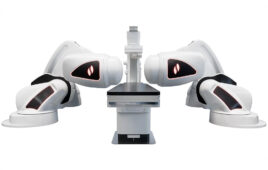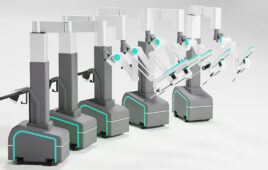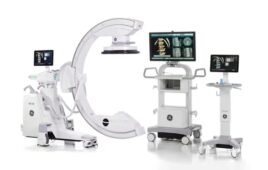|
Listen to this article
|

The Senhance Surgical System keeps time and cost per procedure comparable to traditional laparoscopies. | Source: Asensus Surgical
Challenges facing developers of surgical robots include regulatory approvals, low tolerance for error, and financing. Asensus Surgical Inc. and Karl Storz SE this week issued a filing with the U.S. Securities and Exchange Commission defending the proxy statement about their planned merger.
On June 7, the Asensus Surgical agreed to be acquired by Karl Storz for 35¢ per share in cash. Asensus’ board unanimously approved the agreement, and the company filed a definitive proxy statement on July 5. That statement called for a special meeting of stockholders scheduled for Aug. 7.
Research Triangle Park, N.C.-based Asensus recently obtained Food and Drug Administration approval for its Senhance Surgical System.
Asensus Surgical refutes stockholder allegations
After filing the proxy statement, Asensus Surgical said it received a number of demand letters from purported stockholders. Those letters alleged that there were disclosure deficiencies in the proxy statement. Asensus refuted the allegations.
“The company denies that it has violated any laws or breached any duties to the company’s stockholders, denies all allegations in the demand letters, and believes no supplemental disclosures to the proxy statement were or are required under any applicable law, rule or regulation,” it said in a statement.
However, Asensus decided to voluntarily supplement its proxy statement with new disclosures. The company said it decided to do this to eliminate the burden and expense of potential litigation, to moot claims under the demand letters, to avoid a potential delay or disruption for the merger, and to provide additional information to stockholders.
Asensus said its disclosures comply fully with the applicable law. Nothing in the disclosures reflects an admission of the legal necessity or materiality under applicable law, the company added.
More on the alleged disclosures
The seven disclosures center around confidentiality agreements, the use of consultants, financial advisors, and certain contacts with companies.
Disclosure 1 covers meetings held between Asensus CEO Anthony Fernando representatives of three global medical device manufacturers. Discussions centered around the possibility of strategic collaborations. In connection with those discussions, the company entered into a confidentiality agreement with three companies and a financial sponsor. None contained a standstill provision, asserted Asensus Surgical.
Disclosure 2 amends disclosures made for update calls on which alternatives and a Plan B were discussed. The Asensus board authorized the retention of a consultant to assist management with a preliminary analysis of the company’s cash, sources of cash and secured and unsecured obligations.
Disclosure 3 modified the company’s description of its engagement with Jefferies as a financial advisor. Asensus engaged Jefferies to offer financial advice and assistance in connection with a sale or other transaction. The only offer the company received related to this was its letter of intent from Karl Storz.
Disclosure 4 covered discussions around the activities of management over the two years prior to finding a buyer. That included the discussions with the companies in Disclosure 1. The Asensus board also formed a transaction committee for a number of reasons outlined in the filing.
Disclosure 5 outlined contact between Fernando and the companies engaged in Disclosure 1. Representatives from three companies congratulated Asensus’ CEO on the proposed letter of intent from Karl Storz. The company said none demonstrated any interest in any potential transaction.
Disclosure 6 amended a statement of Jefferies’ calculated terminal values by adding “per the management of Asensus.”
Disclosure 7 clarified that cash flow values were derived from a weighted average cost of capital calculation.
Editor’s note: This article was syndicated from The Robot Report sibling site MassDevice.







Tell Us What You Think!